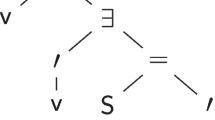Abstract
Modal Platonism utilizes “weak” logical possibility, such that it is logically possible there are abstract entities, and logically possible there are none. Modal Platonism also utilizes a non-indexical actuality operator.
Modal Platonism is the EASY WAY, neither reductionist nor eliminativist, but embracing the Platonistic language of abstract entities while eliminating ontological commitment to them.
STATEMENT OF MODAL PLATONISM. Any consistent statement B ontologically committed to abstract entities may be replaced by an empirically equivalent modalization, MOD(B), not so ontologically committed. This equivalence is provable using Modal/Actuality Logic S5@.
Let MAX be a strong set theory with individuals. Then the following Schematic Bombshell Result (SBR) can be shown:
MAX logically yields [T is true if and only if MOD(T) is true], for scientific theories T.
The proof utilizes Stephen Neale’s clever model-theoretic interpretation of Quantified Lewis S5, which I extend to S5@.
Similar content being viewed by others
References
Boolos, G. (1979) The Unprovability of Consistency: An Essay in Modal Logic, Cambridge University Press.
Bueno, O. (2000) Empiricism, mathematical truth and mathematical knowledge, in N. Shanks and R. B. Gardner (eds.), Logic, Probability and Science (Amsterdam, Atlanta), Poznan Studies in the Philosophy of the Sciences and the Humanities 71, Rodopi, pp. 219–233.
Bueno, O. (2002) Is full-blooded Platonism defensible?, delivered before the Central Valley Philosophers Association, Fresno, California, April.
Bueno, O. (2002) Skepticism about mathematical knowledge: Is mathematical knowledge just modal knowledge, unpublished manuscript.
Burgess, J. and Rosen, G. (1997) A Subject with no Object, Clarendon Press, Oxford.
Chellas, B. (1980) Modal Logic: An Introduction, Cambridge University Press.
Chihara, C. (1990) Constructibility and Mathematical Existence, Clarendon Press, Oxford.
Churchland, P. and Hooker, C. (1985) Images of Science (with a reply by van Fraassen), University of Chicago Press.
Cleveland, R. Gödel’s proof of the existence of God, unpublished manuscript, Mathematics Department, California State University, Sacramento, California.
Cresswell, M. J. (1990) Entities and Indices, Kluwer Academic Publishers, Dordrecht.
Einstein, A. (1921) Relativity: The Special and the General Theory, Holt, New York.
Field, H. (1980) Science Without Numbers, Princeton University Press.
Field, H. (1989) Realism, Mathematics, and Modality, Basil Blackwell, Oxford.
Gödel, K. (1940) The Consistency of the Continuum Hypothesis, Princeton University Press.
Hellman, G. (1989) Mathematics without Numbers, Clarendon Press, Oxford.
Hilbert, D. (1925) On the infinite, in Benacerraf and Putnam (eds.), Philosophy of Mathematics: Selected Readings, 1983 (2nd edn.), Cambridge University Press.
Hodes, H. (1984) Axioms for actuality, J. Philos. Logic 13, 27–34.
Hodes, H. (1984) On modal logics which enrich first-order S5, J. Philos. Logic 13, 423–454.
Hughes, G. E. and Cresswell, M. J. (1968, 1972) An Introduction to Modal Logic, Methuen and Co., London.
Hume, D. (1739–40) A Treatise of Human Nature, edited by L. A. Selby-Bigge, 1888, Clarendon Press, Oxford.
Hume, D. (1779, 1948) Dialogues Concerning Natural Religion, Hafner Publishing Co., New York.
Jubien, M. (1988) Problems with possible worlds, in D. F. Austin (ed.), Philosophical Analysis, Kluwer Academic Publishers, Dordrecht.
Jubien, M. (1993) Ontology, Modality, and the Fallacy of Reference, Cambridge University Press.
Kaplan, D. (1995) A problem in possible worlds semantics, in W. Sinnott-Armstrong et al. (eds.), Modality, Morality, and Belief, Cambridge University Press.
Kaplan, D. (1979) Transworld heir lines, in M. Loux (ed.), The Possible and The Actual, Cornell University Press, Ithaca, NY.
Kripke, S. (1963) Semantical considerations on modal logic, Acta Phil. Fennica 16, 83–94; also in L. Linsky (ed.), Reference and Modality, Oxford University Press, 1971.
Kripke, S. (1972, 1980) Naming and Necessity, Harvard University Press, Cambridge, MA.
Levy, A. (1960) Principles of reflection in axiomatic set theory, Fund. Math. 49, 1–10.
Lewis, D. (1970) Anselm and actuality, Nous 4, 175–188.
Lewis, D. (1973) Counterfactuals, Basil Blackwell, Oxford.
Lewis, D. (1991) Parts of Classes, Basil Blackwell, Oxford.
Menzel, C. (1990) Actualism, ontological commitment, and possible world semantics, Synthese 85(3), 355–389.
Quine, W. (1948) On what there is, in From a Logical Point of View, 1953, 1961, Harvard University Press, Cambridge, MA.
Schilpp, P. A. (ed.) (1963) The Philosophy of Rudolf Carnap, Open Court, La Salle, IL.
Shepherdson, J. (1951–53) Inner models for set theory, Parts I–III, J. Symbolic Logic.
Tarski, A. (1931–35) The concept of truth in formalized languages, in Logic, Semantics, and Metamathematics, 1956, Clarendon Press, Oxford (Revised Edition, 1983, John Corcoron (editor), Hackett Publishing Co., Indianapolis).
Tarski, A. (1938) Über unerreichbare Kardinalzahlen (On inaccessible cardinal numbers), Fund. Math. 30, 68–89.
van Fraassen, B. and Lambert, K. (1972, 1986) Derivation and Counterexample, Dickenson Publishing Co., Encino, CA.
van Fraassen, B. (1975) Platonism’s pyrrhic victory, in A. L. Anderson et al. (eds.), The Logical Enterprise, Yale University Press, New Haven, pp. 39–50.
van Fraassen, B. (1980) The Scientific Image, Clarendon Press, Oxford.
van Fraassen, B. and Beall, J. C. (2003) Possibilities and Paradox: An Introduction to Modal and Many-Valued Logic, Oxford University Press.
Zermelo, E. (1930) Über Grenzzahlen und Mengenbereiche (On limit numbers and set construction), Fund. Math. 16, 29–47.
Author information
Authors and Affiliations
Rights and permissions
About this article
Cite this article
Friedman, J.I. Modal Platonism: an Easy Way to Avoid Ontological Commitment to Abstract Entities. J Philos Logic 34, 227–273 (2005). https://doi.org/10.1007/s10992-005-0557-4
Issue Date:
DOI: https://doi.org/10.1007/s10992-005-0557-4



